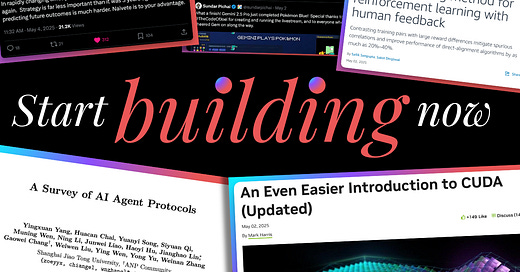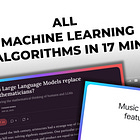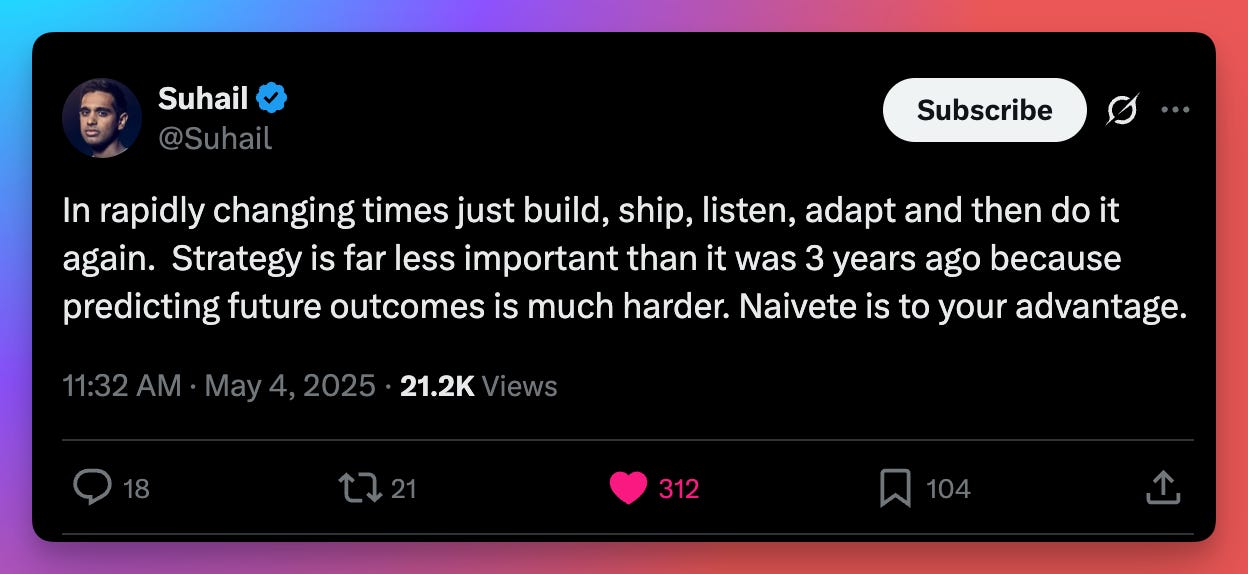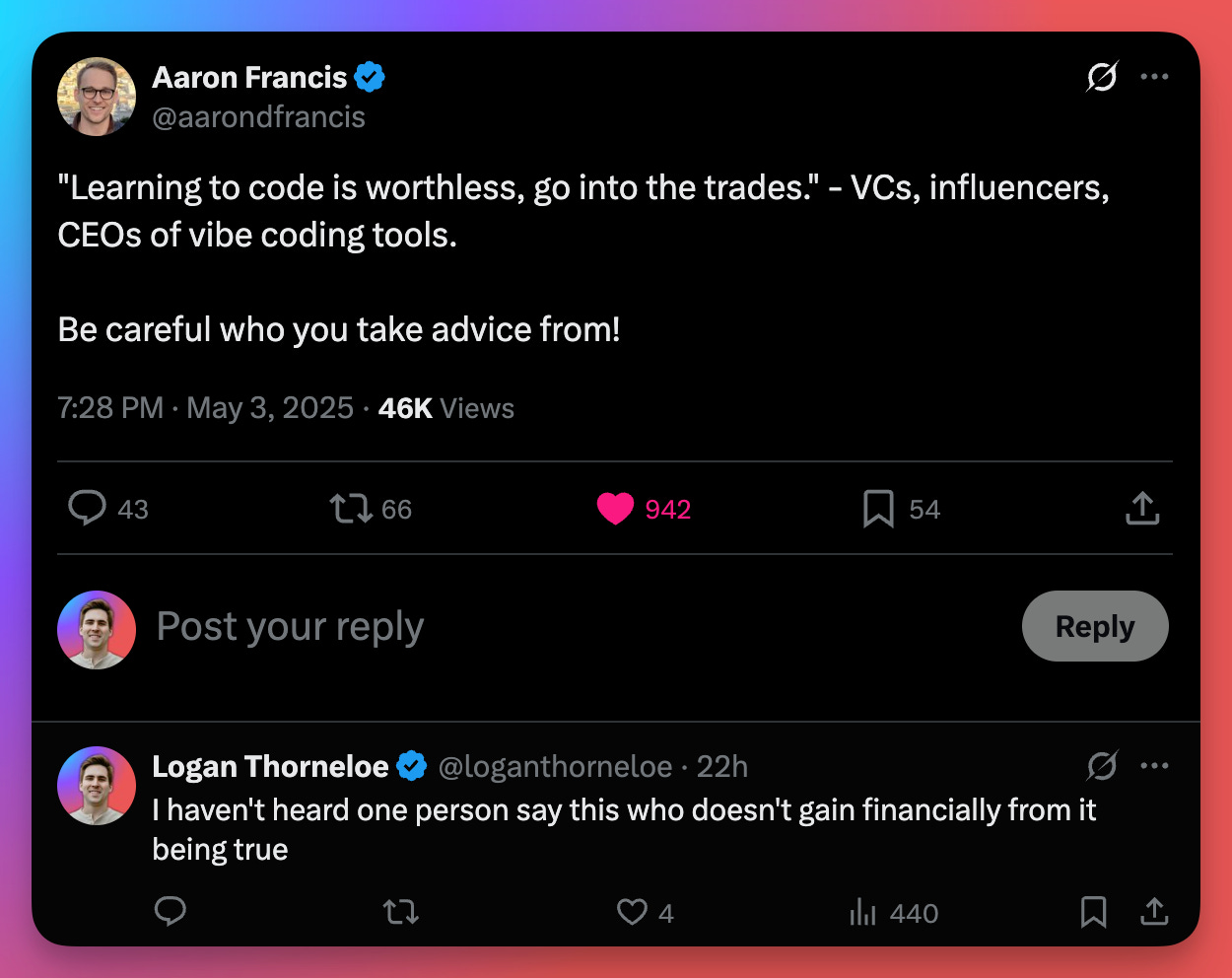Now is The Best Time to Be a Software Engineer (ML for SWEs 9)
Machine learning for software engineers 5-5-25
Welcome to our weekly curated machine learning roundup specifically for software engineers. Each week I detail:
Important takeaways from recent AI events.
Resources to help you become a better engineer.
Other interesting things you won’t want to miss.
Subscribe to get these right in your inbox. Paid subscribers will also get a monthly, noise-free, comprehensive AI roundup (monthly events, an AI job market overview, top monthly resources, and more). You can become a paid supporter for just $3/mo for life right now:
If you missed last week’s Machine Learning for Software Engineers, we talked about the importance of professionals to adopt AI tools to prove their value. You can check it out here:
Right now is the absolute best time to be a software engineer. This is for one reason in particular: development velocity. AI has already proven itself as a valuable programming partner (if used properly!) making it much quicker to spin up MVPs and add features. We aren’t just seeing small hobbyists and indie developers adapting AI to their workflow; we’re also seeing large companies do the same.
What’s going to become very evident over the next few months is which companies inhibit their own development velocity via red tape and bloated processes that block quick adaptation and prototyping. With the help of AI, it’s becoming so fast to prototype that most of the processes large companies use to make sure they’re investing their time correctly will be slower than building, pivoting, and rebuilding as needed.
We’ll see companies (or orgs within companies) that inhibit developer velocity fall behind and we’ll see them hemorrhage talent as their most talented developers become increasingly frustrated with their processes. Nothing frustrates software engineers as much as distractions keeping them building things. Tech has literally created an entirely separate job to do all the non-building parts of software creation because we don’t want anything to keep us from building.
We’ll see a huge shake up in the software engineering job market in the next two to three years specifically because of AI. No, I don’t think it’s because all software engineers will lose their job like most influencers like to proclaim. It’s because AI will fundamentally change what we do. Software engineers will be able to get more done and will focus less on coding and more on solving problems (as we already should be!).
This brings me to my next topic: Right now is an excellent time to learn how to code. It breaks my heart to see college kids decide not to study computer science or pivot out of it because an influencer has told them it won’t exist in a year. It especially grinds my gears when these influencers stand to gain financially from this being the case. That influencer’s agenda might be pushed, but they’ve seriously altered the trajectory of someone’s life.
The great CS exodus is getting so bad that I frequently see Reddit comments about how in-demand senior engineers will be soon because there won’t be enough juniors to replace them. I don’t think most realize how much of an impact a short supply of juniors will have on the long-term health of the field.
I encourage anyone and everyone to study CS and reach outside of their comfort zone to explore more disciplines within CS that they’re interested in. I’m saying this as an individual who would gain financially from fewer people studying CS due to less competition.
Now you might ask: How can you encourage more people to become software engineers with the condition of the job market right now? I’ve got a few thoughts about this that I’ll share at the risk of being greatly disliked for sharing them.
First, I haven’t seen any definitive data that hiring is significantly lower than pre-covid levels. Every plot/dataset I’ve seen “proving” software engineering jobs are all going away has been misinterpreted or purposefully manipulated. When you actually look at the data, it shows hiring has fallen to pre-covid levels and we’ve all been used to the massive hiring/pay boom we saw when interest rates are low.
What I have seen with this fall to pre-covid hiring levels is a strong hiring preference toward developers with experience. Essentially, we have what we had before covid but with a much more uneven distribution. This is why it’s so difficult to find a job as a new grad or junior engineer. How can you have experience without having worked?
We’ve also seen a lot of mid- to senior-level engineers lose their job and have a hard time finding a new one quickly. As far as I can tell, this is for a few reasons:
Large-scale layoffs always create greater competition when hunting for a job even when positions are available.
The hiring preference toward experience is largely biased toward AI—which has just recently taken off making having experience in it very difficult.
Both of these make for a really bad situation. I feel for those affected by layoffs and those unable to leave bad jobs because it must be an absolutely awful feeling. If you’re reading this and you’ve recently been let go or having a hard time finding a job, my thoughts are with you and I hope Society’s Backend can help.
I’ve been scraping and categorizing AI jobs over the past few months and I’ve found the supply to far outweigh the demand. While software engineering jobs are in a slump, AI-related engineering roles seem to be widely available (remote roles too!). I’ve been sharing some of the more interesting opportunities in our community chat recently. If you want me to share more of what I find, let me know in the comments.
What I think is most important to understand about today’s software engineering job market is that machine learning and AI aren’t going away. There will only be more machine learning systems as time goes on and those systems require a ton of engineers to function. I’ve seen estimates of up to 90% of AI-related roles being positions for software engineers.
Just like any other field and every other job market, software engineers should learn the skills that are in-demand. Right now (and for the foreseeable future) that skill is understanding how to build and work with real-world AI systems.
This is why Society’s Backend exists. I write to help software engineers adapt to working with machine learning systems and I share resources to help you learn. Going forward, I want to put more of an emphasis on learning while building. If any of these things interest you, make sure to subscribe (it’s free!).
Thanks for reading all the way to the end, I hope you enjoy the rest of the resources!
To help you become a better engineer
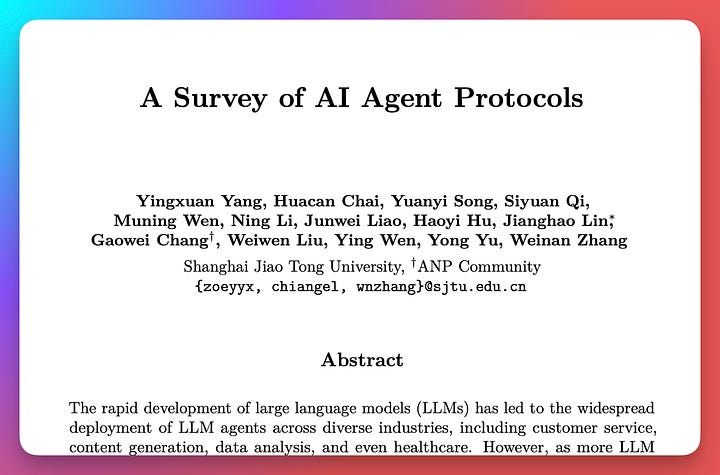

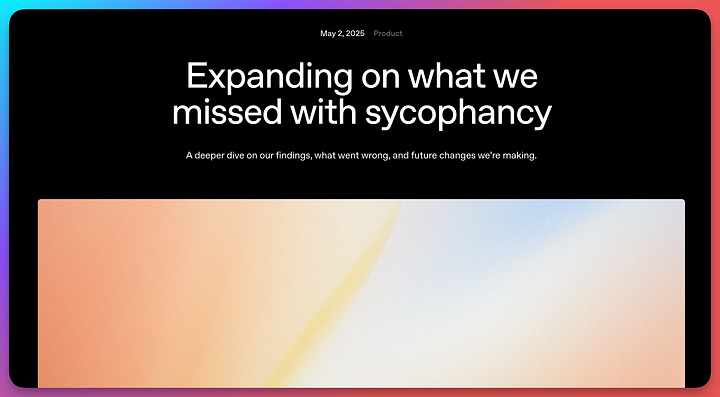
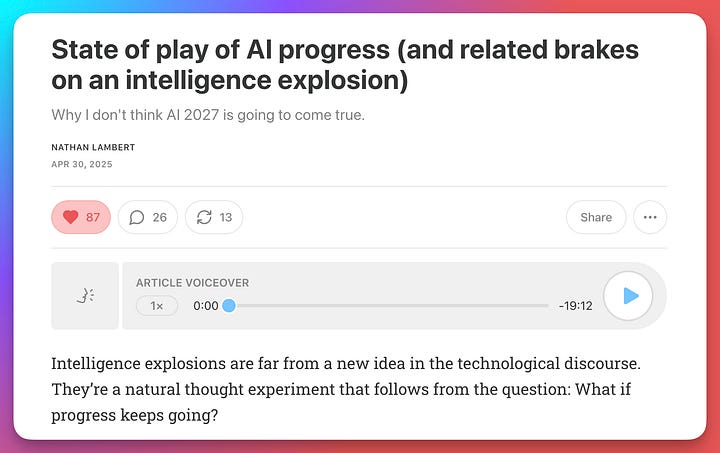
A Survey of AI Agent Protocols: A paper that analyzes existing communication protocols for large language model agents, highlighting the need for standardized frameworks to enhance collaboration, scalability, and performance in diverse applications.
An Even Easier Introduction to CUDA (Updated): A simplified introduction to CUDA, highlighting how to use its features for GPU programming to create parallel applications with the updated CUDA C++ model.
Expanding on what we missed with sycophancy: The article discusses how OpenAI identified and addressed issues in the April 25th model update of ChatGPT, particularly focusing on sycophancy and the need to improve their evaluation processes for future updates.
Brakes on an intelligence explosion by
: AI research is advancing rapidly but is expected to improve across multiple tasks rather than achieving superhuman intelligence, with progress driven by data and increased computing power rather than a sudden explosion of capabilities.
Other interesting things
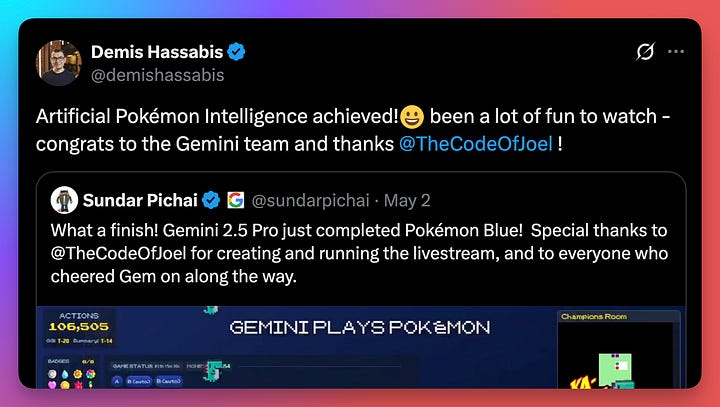
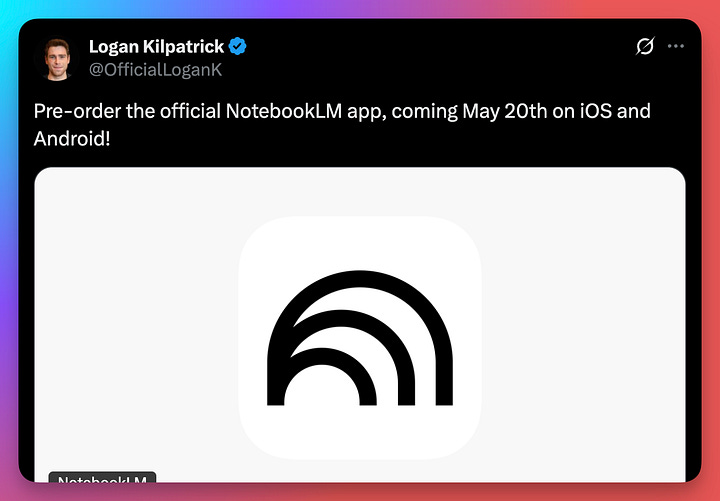
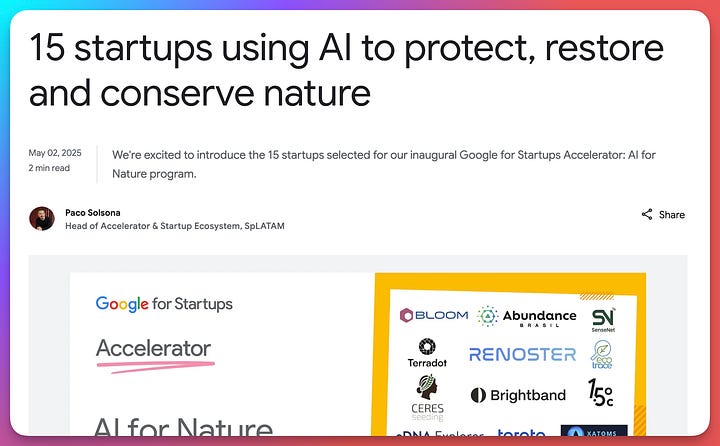
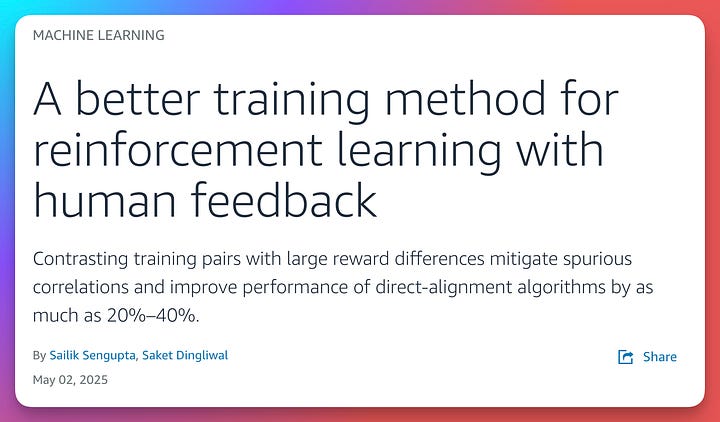
Artificial Pokemon Intelligence has been achieved: Gemini beat Pokemon Blue. It wasn’t entirely without help, but if the previous rate of advancement has taught us anything AI will be beating Pokemon games entirely without help in only a few months.
Google is releasing a NotebookLM app: NotebookLM will now be available on your phone. NotebookLM has been a great knowledge gathering tool and a great research companion. It releases on both Android and iOS on May 20th.
15 startups using AI to protect, restore, and conserve nature: Fifteen innovative startups are leveraging AI and advanced technologies to address critical environmental challenges such as biodiversity protection, ecosystem restoration, and effective conservation through participation in Google’s AI for Nature Accelerator program.
A better training method for reinforcement learning with human feedback: The SeRA method improves reinforcement learning with human feedback by generating additional training examples and filtering responses based on their preference scores, thereby reducing the risk of spurious correlations in large language models.
That’s all for this week!
Always be (machine) learning,
Logan

